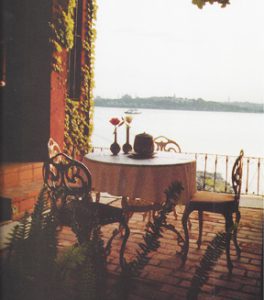 Sufism is not only the sublime poetry of a Rumi; it is also how we relate to others, how we receive a guest, how we fulfill our responsibilities. The work of Sufism is not primarily acquiring information; it is more about clearing the mirror of consciousness. As rich as the treasure of Sufi knowledge is (an immense intellectual heritage), most of us would not have been drawn to this path if we had not encountered its love embodied in human relationships.
Sufism is not only the sublime poetry of a Rumi; it is also how we relate to others, how we receive a guest, how we fulfill our responsibilities. The work of Sufism is not primarily acquiring information; it is more about clearing the mirror of consciousness. As rich as the treasure of Sufi knowledge is (an immense intellectual heritage), most of us would not have been drawn to this path if we had not encountered its love embodied in human relationships.
Recently I began to ask the question: What are the practical lessons we have learned from our spiritual teachers and friends on the Path? We are looking forward to two upcoming retreats: Dorset, England, 8/30-9/1 and Garrison, New York, October 3-6 on the theme of “Practical Sufism.”
Practical Sufism does not reduce Sufism to mere physical or social activities. It is the expression of the divine in everyday life. Sufism is more than an intellectual amusement, a literary past-time, or mere metaphysical speculation. Sufism proves its value in our actions, in our relationships, and in the quality of our lives in general.
For millennia prophets, messengers, and saints have brought spiritual teachings to humanity. But people have often reduced these great teachings to an empty shell of dogmatic assertions and formalities. Sufism focuses on the guidance of Prophets and Saints that leads to the refinement of human sensibilities.
The fully conscious human being is the threshold between two worlds: the realm of spiritual essence and qualities, on the one hand, and the manifest reality of this world, on the other. In bridging the two worlds, we fulfill the purpose of being human: the embodiment of spiritual meaning and qualities.
From the vantage point of contemporary human life, we face certain challenges, distractions, and distortions that compromise the soul. One aspect of spiritual teaching is to unblock the expression of the soul’s qualities. When the soul is primarily involved in the material satisfactions of comfort, food, and sensory pleasure, it develops a spiritual deficiency. And when the soul is confined within the “box” of egoism, it forfeits its most comprehensive happiness, which is attained only when the life of “the world” is infused with the qualities of “heaven.”
Here are some of the practical aspects of Sufism that we hope to focus on in the coming months:
How we use our attention
A Sufi will increasingly become someone with a highly developed power of attention. What we put our attention on we magnify. Therefore, we learn to become aware of our awareness, noticing what attracts our attention and why. We can be simultaneously aware of our environment, how we are relating to it, and where we want to hold our attention. To give a very simple example: If we are in sohbet (spiritual conversation) with our teacher, and someone arrives late, our heads don’t automatically turn in the direction of the person who just entered, even though we are aware that someone has walked into the room. Similarly, we gradually learn to keep our attention more and more focused on what we really value. We notice how we allow ourselves to be distracted by trivial matters and neglect our highest aim, but we eventually learn to take full responsibility for our attention. We become doorkeepers of the heart.
How we interact with others
A true Sufi is someone whose egoism is diminishing every day. What we mean by egoism is whatever promotes or draws attention to the self; in other words, anything that reinforces self-importance.
On the one hand, almost every human being has personal insecurities, and, on the other hand, we want to be appreciated by others. How can we unify these disparate conditions? Every attempt to appear as more than we are is counterproductive. Self-praise does not go very far. Nor does false humility.
The Sufi is engaged in the fine art of becoming nothing and no one. Shams says: When the “I” disappears, God appears.
How hospitable, openhearted, compassionate, inclusive, and non-judgmental we are
When Westerners, especially Anglo-Saxons or northern Europeans, first encounter real Sufi culture, they are blown away by its warmth and inclusiveness. In this encounter we begin to see the many self protective behaviors that we adopt, rather than openly expressing our hearts. Even with people we love and trust we may be reticent to express the full range and depth of our feelings. Perhaps we fear rejection. Perhaps we fear that we will be perceived as needy or weak. Worse yet, we keep accounts of what we owe, and who owes us how much. Perhaps we withhold ourselves from others because we think that giving too much of ourselves implies subservience. In truth, the greatest human beings are the humblest servants. As Rumi says, “Rather than begging on the street for bread, the Sufi begs to give you his life.”
How we care for the world around us, balancing the energies within our living space and general environment
The Sufi learns the hidden relationships of pattern, proportion, and how to maintain space. Beginning with a prayer carpet and the qiblah, the direction of prayer, sacred space is created in our lives. The Divine creates with order and proportion. The conscious human being incorporates a sense of order, proportion, and space. Once one of our teachers asked: “What is the difference between sacred space and the environments of the secular or commercial world?” Within sacred space, as opposed to secular or commercial space, every object has a meaning or an intention. Eventually we come to know how to maintain the sacred space of our lives.
How we maintain a state of consciousness free of prejudice, negativity, and distortion
On the spiritual path we will inevitably encounter subtler and subtler forms of vanity and egoism. The crude self-righteousness that demonizes other races, religions, or cultures may be obvious forms of prejudice we would not condone. However, what about our own subtle idolatries, our attachment to having inside knowledge, special channels of grace, or association with powerful spiritual figures? Are we to smash all idols or just some of them? In reality when we say this teaching is the purest, deepest, greatest truth, what we are actually saying is this is the greatest truth to me. We fail to recognize our own subtle tendency to deify what pleases us.
A Sufi saying goes, “For the man who loves kabobs, he would like to call them divine if anyone would allow it.”
Step by step, as a matter of principle, we strive to transcend our vanity and egoism with humility and the discipline of selflessness.
How much we are open to the ecstatic nature of being
It is important that we know that through spiritual ideas we can resonate with higher realities. There is a big difference between the kind of conceptualizing that blocks reality and the true metaphysical speculation that opens us to spiritual Intellect. There is something in the soul that is not created and not creatable. This is the true Paradise. This is what the Complete Human Being (al Insan al Kamil) comes to know. The human being can connect to all levels of being through the Ruh (Spirit), the axis at the core of our being. All the practices, customs, and relationships of the Path serve to make that connection real, and this is the most practical outcome of all. We call this being a friend of God.


